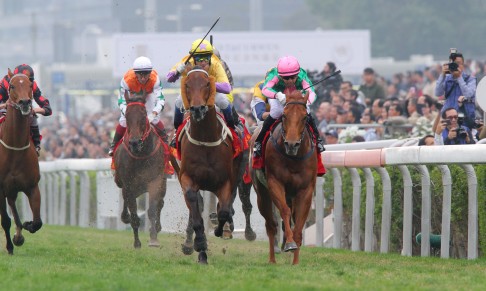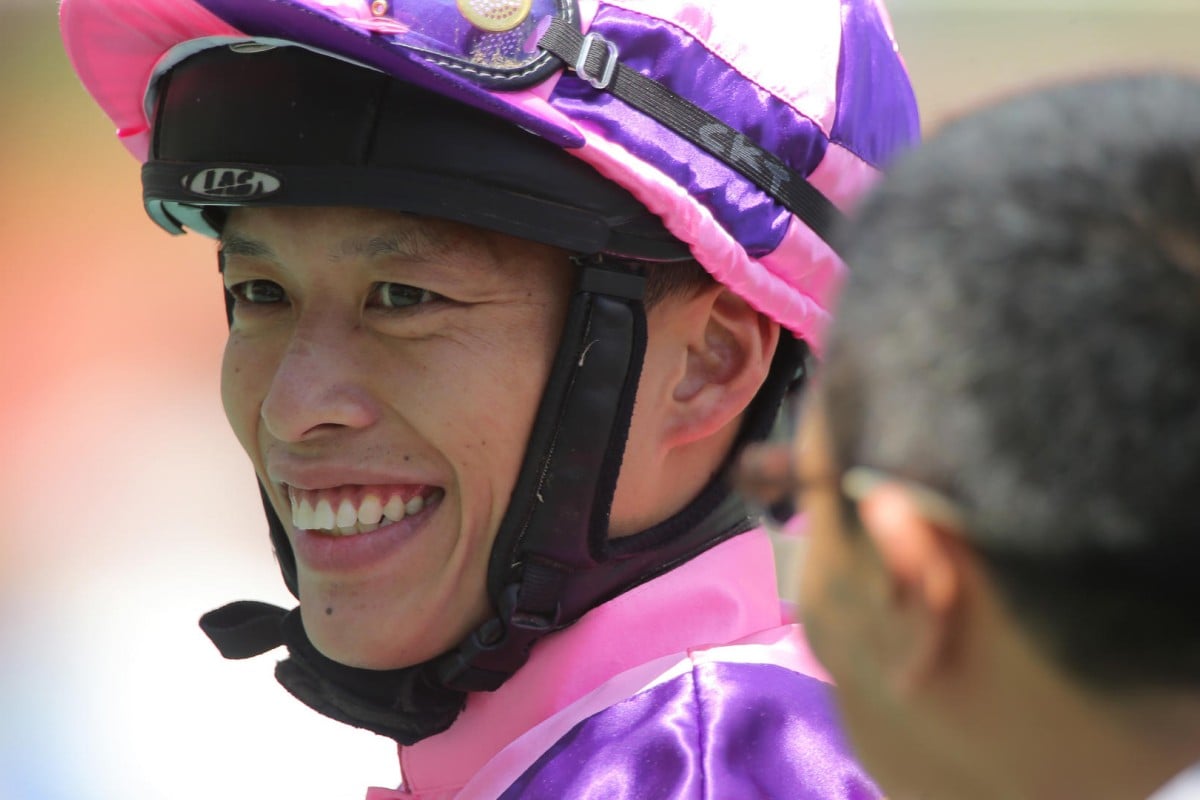We stand before you today, m'lud, in the matter of Jacky Tong Chi-kit versus the Licensing Committee. We appear for Mr Tong.
And, on this rare occasion, we find ourselves agreeing with an opinion published in the Chinese language press. For what reason does Jacky Tong, or another local jockey, have to show cause?
In short, where's the harm for Hong Kong racing which is sufficient to warrant the Licensing Committee making a judgment call about Tong's ability and ending his career?
If he is so poor a jockey, eventually nobody will want him to ride their horses and Tong will leave for economic reasons.

Or will that day ever come? We think not. And we ask you, m'lud, to consider the wider situation and its implications.
Hong Kong racing is conducted under a drop handicap system. Horses move in and out of form and up and down the handicap over time. Many find themselves too highly handicapped to be competitive or they are out of form due to health, age or fitness.
Those are horses which carry little in the way of betting money and which Tong largely steers around. And if Tong is no longer to do this job, will they steer themselves around?
No. What will happen is that the job will fall to another jockey or set of jockeys, some or all of whom might one day appear before Licensing for a show cause because they haven't ridden enough winners.
Not every horse can be ridden by Joao Moreira or Zac Purton or their ilk. Remove Tong, and Douglas Whyte and Brett Prebble won't take up these legless mounts, but someone will.
Thirty Chinese jockeys rode during the 1994-95 season when there were only 551 races. Now we have 777 races and just 12 local riders, so it would be difficult to argue that there aren't enough rides to go around. There are not, however, sufficient good rides and that part has not changed. The majority of the big group of locals 20 years ago rode four winners or less.
It is the Licensing Committee which has torpedoed the local riders and condemned them to a potential show cause future. Karis Teetan, Joao Moreira and, next season, Richard Fourie and Chad Schofield, will take many of the rides with winning chances which might have fallen to local jockeys by dint of being too light for the expats.
But the lighter expats will be happy to leave the ordinary light ones to a Tong or a So or a Lai or a Leung and steer them toward a profile over time that includes fewer winners as a result.
And let's examine, your honour, the matter of Mr Tong's competence or otherwise.
Let's use horses with at least some small expectation of victory, the group paying $210 or less for a $10 bet. In the past five years, Tong has had 310 such mounts and won on 23 of them, a strike rate of 7.4 per cent. In the same period, Zac Purton has had 2,258 rides paying under $210 and won on 399, a strike rate of 17.7 per cent.
But that is not a fair comparison. Many of Purton's horses in this group were much, much shorter than $210, hundreds of them favourites and strongly expected to win.
So let's line them both up where most of Jacky Tong's mounts live - between $110 and $210 was the starting price for 205 of those 310 rides. He won on 15 of those, or 7.3 per cent.
Purton, in the same odds bracket, had 528 for 31 wins - 5.9 per cent. Douglas Whyte had 442 rides in that group and won 20 times - 4.5 per cent.

This is not to say Jacky Tong is better than or equal to Purton or Whyte, but to the extent that this addresses whether Tong is doing a competent job on what he has to work with, those figures suggest he is doing as well as might be expected.
Trainers' licences are a different matter altogether and it is right to demand a certain level of performance. A trainer requires stabling provided by the club over a long period. Stabling requires space, which is in short supply, and an unsuccessful trainer is taking up space.
A local jockey needs only horses to ride. Hong Kong is his home. The Jockey Club does not have to provide him with housing or other facilities, as it does for expats. Tong is not being accused of corrupt practices, only of not riding enough winners. If he is not a danger to himself or others, and is content to ride with the prospect of only a few surprise wins a season, then why should he be prevented from doing so? The defence rests.
Missing the point on remedying track bias at Sha Tin
Surely the baby got thrown out with the bathwater when changes were announced affecting the status of straight 1,000m racing at Sha Tin.
This column has been critical of the patently unfair straight course. The blame has been laid on the increase in straight barrier trials and the resulting wear, tear and repair on the section nearest the outside rail making it firmer and faster.
A remedy has been proposed: a false rail four metres inside the grandstand rail, cutting out the affected section. If the point of that exercise is to make the course fairer, wouldn't it have made more sense to see the outcome and leave the Centenary Sprint Cup alone?

We're not buying any of the explanations for why the Centenary Sprint is now 1,200m and Hong Kong is without a Group One at 1,000m.
Another 1,200m race will be better patronised? The Sprint Cup over 1,200m was created in 2008 and has averaged only nine runners. The Centenary Sprint in the same period averaged 10.
Of the Bauhinia Sprint, Centenary Sprint, Queen's Silver Jubilee and Chairman's Sprint Prize, the only ones to have had a full field of 14 since 2005 are the two down the straight, the Centenary in 2013 and Bauhinia in 2009 and 2015. The normal field size for any of these four spring sprints over the last 15 years is about 10 runners.
For a sprinter-miler jurisdiction like Hong Kong to not have a Group One 1,000m race at all is absurd, especially when we have three 2,400m Group races. If field sizes are the rationale then the Champions & Chater must go.
Then there's the view that straight-track specialists like Amber Sky or Eagle Regiment would now prep for Dubai's Al Quoz Sprint by running 1,200m around a bend. It's missing all the points.
Horses usually head overseas off a good performance, not a failure in something unsuitable and the hope that they'll bounce back on foreign soil. And straight Group Ones here enabled these horses to take their ratings high enough to be invited to Dubai, or give their people the confidence to try it.
The false rail as an attempt to do something about the hideous straight-course bias? An overdue and worthy guess at a problem, which has been unacceptable.
The change to the Centenary Sprint Cup just looks like a silly answer to a question nobody was even asking.

















